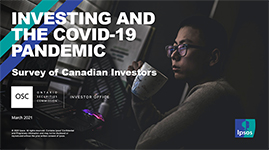Published: April 7, 2021
The OSC study, Investing and the COVID-19 Pandemic, explores the impact of the pandemic on the behaviours and attitudes of retail investors. This study is part of the OSC’s ongoing efforts to monitor the impact of the pandemic on investors and markets.
The COVID-19 pandemic has uniquely affected the financial situation of each retail investor. Most investors are simply trying to endure the hardship and uncertainty of the pandemic, but some see it as an opportunity to increase their participation in the capital markets.
Investing and the COVID-19 pandemic
OSC Investor Office
Published: April 7, 2021
Download the full study
Key highlights
Canadian investors are not financially prepared for emergencies
31% of Canadian investors said they would be unable to afford an unexpected expense of $5,000 within their current cash flow. Among those who would turn to selling assets or borrowing, most would turn to a bank loan or line of credit, withdraw from their investment account, or carry a balance on their credit card. Nearly 1 in 10 Canadian investors reported having faced an unexpected expense of $5,000 or more due to COVID-19, and another one in ten expected to face it if the pandemic were to continue until April 2021.
Half of Canadian investors stopped contributing to a savings goal
Nearly half (45%) of Canadian investors who were putting money towards a financial or personal goal stopped contributing toward their goal(s) during COVID-19. This represents about 35% of all Canadians.
However, over 8 in 10 of those saving towards goals like their children’s education or retirement continued to make progress towards these goals.
Most Canadian investors are pessimistic about prospects for the economy
Half (53%) of investors believe the COVID-19 pandemic will have a negative effect on the Canadian economy that will last past March 2022, while nearly 4 in 10 (37%) thought the negative effects will not last that long.
Half of Canadian investors have been ‘active’ in terms of investing during COVID-19
While half (52%) of Canadian investors have been passive investors during the pandemic, the other half (48%) can be classified as being ‘active investors’, meaning that they bought and/or sold investments during this time.
63% of active investors increased their holdings by buying more investments than they sold.
Those who sold did so to pay for expenses (29%) and to realize profits from increased market prices (17%).
Among active investors, most saw an opportunity to grow their portfolio; however, those who sold did so because they needed the money
Active investors, who were buying and selling during the pandemic, can be further dissected into ‘net buyers’, ‘net sellers’ and ‘net zero’ investors.
Net buyers were more likely than both passive investors and net sellers to say their financial situation is better.
Passive investors were more likely to say their financial situation has been unaffected by the pandemic but have not yet invested.
Higher investment stress tends toward selling, while lower stress tends toward buying
3 in 10 investors have become more stressed about their investments during the pandemic. Those age 35-54 were disproportionately affected, with this group comprising half (49%) of those who describe their stress level as “high” or “very high”.
Almost half of Canadian investors correctly answered questions that assessed their financial knowledge; however, even these investors still want a better understanding of their financial situation.
At least 7 in 10 answered correctly to a given financial knowledge question and nearly half were able to correctly answer all three questions. Knowledge was consistently higher among older investors, men, those with more education, those with more than $500,000 in investments, and those who have been active investors.
Despite having a good understanding of the fundamentals, all Canadian investors still want to improve their understanding of their financial situation.
About the study: The OSC conducted a survey of 2,000 Canadians between September 25 to October 5, 2020 to further its understanding of retail investor experiences during the pandemic. These findings will be used to inform investor protection and education efforts related to the ongoing pandemic and economic recovery.

